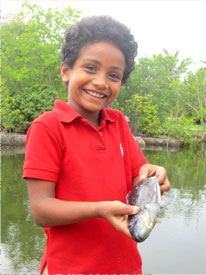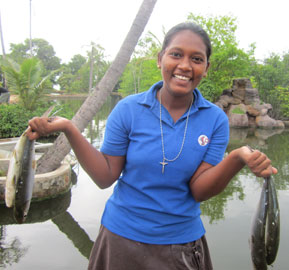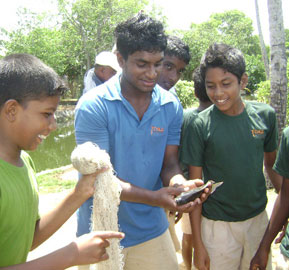Sustainable Fish Farming

The vocational training program on the Kalapuwa Sri Leadership Academy campus is an ongoing project that began in 2009. To make the project more self-sustaining, CEI constructed a fish processing facility that has added greatly to the scope and efficiency of the previous vocational training program. The unit helps facilitate the cleaning, processing and ultimately the marketing of the fish where the children can be directly involved. The facility also provides training on the best practices, methods of maintaining the quality and standard of the farmed fish, and the packaging and final delivery of the fish. Students are also involved in the money management aspect of the project and have the opportunity to learn important accounting skills.
As fish farm expert and project manager, Mr. Maximus Fernando, says of the project, "This is a profitable venture that has a significant social contribution to the well being of the children at the leadership academies and contributes to the awareness and general understanding of self-sustainable methods of fish farming".
The Kalapuwa Sri Sustainable Fish Farm Project grew out of the necessity of transforming the swampland where the Kalapuwa Leadership Academy was built. Kalapuwa Sri Leadership Academy opened in May 2008 with a capacity to house 400 children. This five-acre home for boys was an arduous labor of love made possible by support from Architects Without Borders, Engineers Without Borders,and the Moyer Foundation, as well as countless other donors and volunteers from around the world.
Engineers Without Borders designed the lagoon system that is now the site of the sustainable fish farm project that currently has nearly 5,000 Tilapia fingerlings and close to 500 large Tilapia along with 250 Milk Fish which is harvested every six months. The region surrounding Kalapuwa Sri derives its income primarily from a fishing industry. Providing our students with the opportunity to learn aquaculture skills and techniques will enable them to enter into the community as employable adults following their graduation from our programs.


This is an innovative and engaging project for the youth at our Kalapuwa Sri Leadership Academy in Pamunugama, Sri Lanka to strengthen their self-esteem and provide them with valuable life skills through the vocational fish farm project. This project is essential to CEI’s commitment to the provision of invaluable vocational training opportunities for our students. By taking on the various responsibilities of proper feeding, cleaning of the ponds, monitoring of pH levels, maintaining a harvest calendar, students are learning valuable skills as well as benefiting from the satisfaction of a successful harvest. The reason we have adopted the method of sustainable fish farming is so that we can teach using principles of ecology, an integrated system of plant and animal production, where practices have a site-specific application that will last over the long term.
